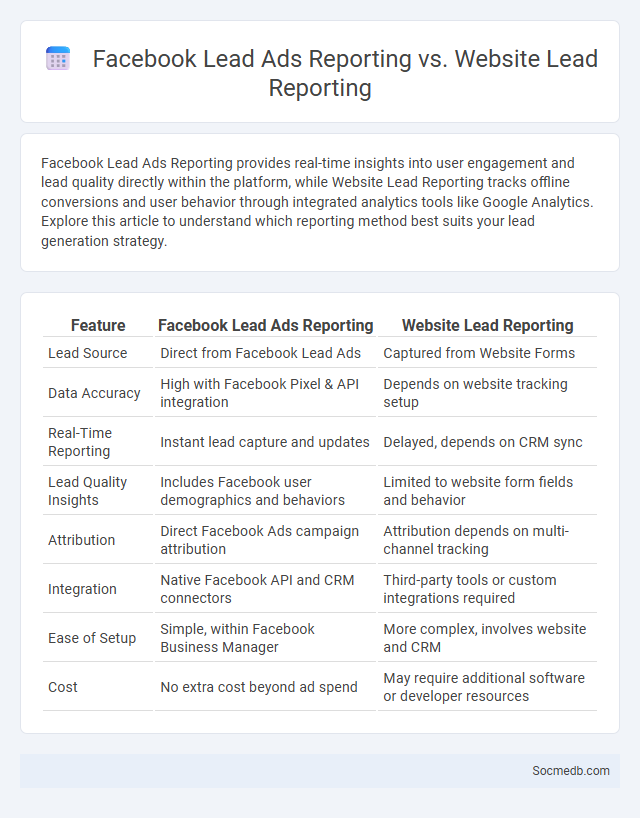
Photo illustration: Facebook Lead Ads Reporting vs Website Lead Reporting
Facebook Lead Ads Reporting provides real-time insights into user engagement and lead quality directly within the platform, while Website Lead Reporting tracks offline conversions and user behavior through integrated analytics tools like Google Analytics. Explore this article to understand which reporting method best suits your lead generation strategy.
Table of Comparison
| Feature | Facebook Lead Ads Reporting | Website Lead Reporting |
|---|---|---|
| Lead Source | Direct from Facebook Lead Ads | Captured from Website Forms |
| Data Accuracy | High with Facebook Pixel & API integration | Depends on website tracking setup |
| Real-Time Reporting | Instant lead capture and updates | Delayed, depends on CRM sync |
| Lead Quality Insights | Includes Facebook user demographics and behaviors | Limited to website form fields and behavior |
| Attribution | Direct Facebook Ads campaign attribution | Attribution depends on multi-channel tracking |
| Integration | Native Facebook API and CRM connectors | Third-party tools or custom integrations required |
| Ease of Setup | Simple, within Facebook Business Manager | More complex, involves website and CRM |
| Cost | No extra cost beyond ad spend | May require additional software or developer resources |
Overview of Facebook Lead Ads Reporting
Facebook Lead Ads Reporting provides detailed insights into campaign performance by tracking metrics such as lead generation, cost per lead, and conversion rates. Your ability to analyze data on demographic engagement, ad impressions, and click-through rates helps optimize marketing strategies for higher ROI. Access to real-time dashboards and customizable reports allows you to make data-driven decisions and improve overall lead quality.
Understanding Website Lead Reporting
Website lead reporting tracks visitor interactions and conversions from social media channels, providing critical data on campaign effectiveness and audience engagement. By analyzing key metrics such as click-through rates, lead sources, and user behavior, you gain insights to optimize your social media strategy and increase lead generation. Accurate lead reporting enables targeted marketing efforts that enhance ROI and drive business growth.
Key Differences Between Facebook and Website Lead Reporting
Facebook lead reporting centers on user interactions within the platform, providing metrics like ad clicks, form submissions, and audience demographics tailored to social media engagement. Website lead reporting captures broader visitor behavior, tracking form completions, bounce rates, and conversion paths across multiple channels beyond social media. Understanding these key differences helps optimize Your lead generation strategy by aligning reporting tools with Your specific marketing goals and channels.
Data Collection Methods Compared
Social media platforms utilize diverse data collection methods including direct user input, behavioral tracking, and third-party data aggregation to gather comprehensive user profiles. Advanced algorithms analyze interaction patterns, geolocation, device information, and multimedia content to enhance targeted advertising and personalized user experiences. These methods raise concerns about privacy, data security, and the ethical use of collected information in digital marketing strategies.
Lead Attribution and Tracking Accuracy
Lead attribution in social media marketing enhances campaign effectiveness by accurately identifying the sources driving conversions through multi-touch attribution models. Sophisticated tracking accuracy is achieved using pixel-based tracking, UTM parameters, and advanced analytics platforms that provide real-time data on user interactions and behavior across various channels. Optimizing lead attribution and tracking accuracy enables marketers to allocate budgets efficiently, improve targeting strategies, and increase ROI from social media campaigns.
Integration With CRM and Automation Tools
Integrating social media platforms with CRM systems enhances customer data management by consolidating interactions and engagement metrics in a single database. Automation tools streamline marketing campaigns, social listening, and personalized customer responses, increasing efficiency and lead conversion rates. Businesses leveraging this integration experience improved customer insights, targeted communication, and a stronger return on investment.
Reporting Metrics and KPIs Analyzed
Tracking social media reporting metrics and KPIs is essential for measuring the effectiveness of your campaigns and content strategies. Key indicators like engagement rate, click-through rate (CTR), follower growth, and conversion rates provide actionable insights into audience behavior and campaign performance. Analyzing these metrics regularly helps you optimize your social media presence and achieve measurable business goals.
Data Privacy and Compliance Considerations
Social media platforms collect vast amounts of user data, making data privacy protection and regulatory compliance critical for businesses and users alike. Compliance with laws such as GDPR, CCPA, and other regional data protection regulations ensures transparent data handling practices and minimizes risks of breaches. Implementing robust data encryption, user consent management, and regular privacy audits are essential strategies for maintaining data integrity and user trust on social media channels.
Common Challenges and Solutions in Lead Reporting
Common challenges in social media lead reporting include inaccurate data attribution, inconsistent tracking across platforms, and delayed reporting updates that hinder real-time decision-making. You can solve these issues by implementing unified tracking systems like UTM parameters and integrating CRM tools with social media analytics for accurate lead source identification. Regular data audits and automated reporting dashboards ensure consistent, timely insights to optimize your lead generation strategies effectively.
Choosing the Right Reporting Method for Your Business
Selecting the appropriate social media reporting method depends on your business goals, target audience, and key performance indicators (KPIs). Utilizing data visualization tools like Google Analytics, Hootsuite, or Sprout Social can provide clear insights into engagement rates, follower growth, and conversion metrics. Your choice in reporting directly influences how effectively you measure success and optimize content strategies.
 socmedb.com
socmedb.com